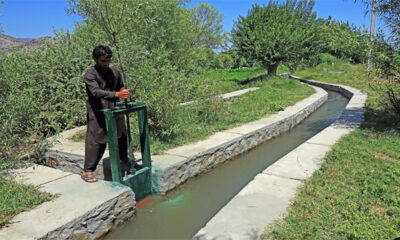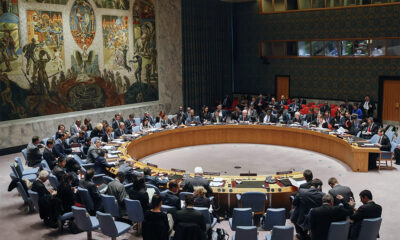Latest News
Daesh leader Quraishi kills himself during Syria raid, U.S. says
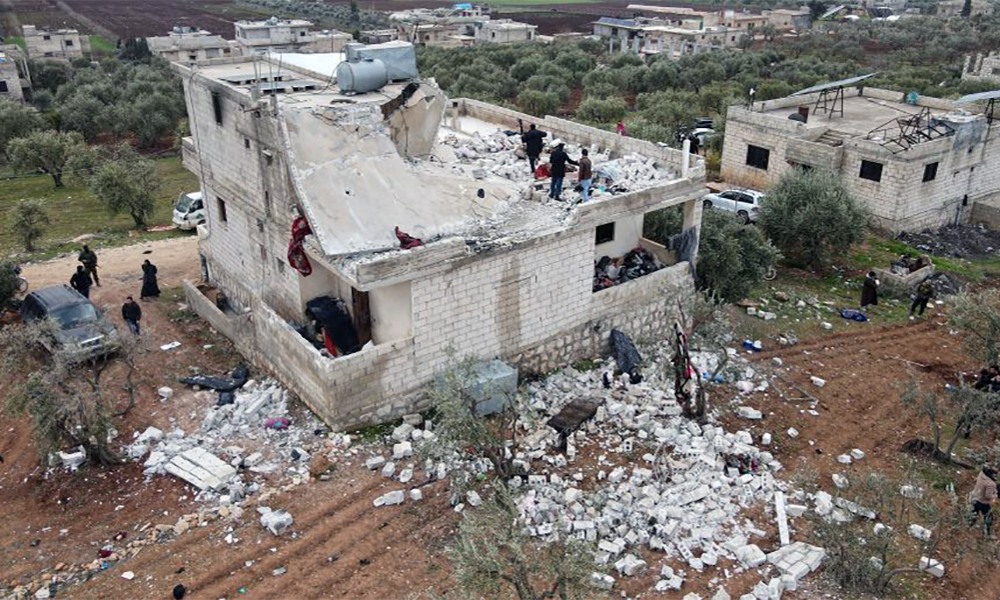
The leader of Daesh died when he blew himself and family members up during a U.S. military raid in Syria, President Joe Biden said on Thursday, dealing a blow to the jihadist group’s efforts to reorganize as a guerrilla force after losing large swathes of territory.
Abu Ibrahim al-Hashemi al-Quraishi, had led Daesh since the death in 2019 of its founder Abu Bakr al-Baghdadi, who was also killed when he detonated explosives during a raid by U.S. commandos.
As U.S. forces closed in on Quraishi in northwestern Syria overnight, he triggered a blast that also killed members of his own family, including children, according to Biden and U.S. officials.
The blast was so big it hurled bodies out of the three-storey building where Quraishi was and into surrounding streets in the town of Atmeh, U.S. officials said, blaming Daesh for all civilian casualties.
“Thanks to the bravery of our troops, this horrible terrorist leader is no more,” Biden said in remarks at the White House.
A senior White House official said the blast was believed to have killed Quraishi, his two wives and a child on the third floor, and likely a child who was on the second floor with Quraishi’s lieutenant and his wife, who were killed after firing on U.S. forces. Two additional fighters were killed after firing on U.S. helicopters, the official said.
Quraishi had been using the house and an unwitting family living on the first floor as a “protective shield,” a factor that complicated planning for the raid, the official added.
The official was unable to explain the discrepancy between those numbers and those provided by Syrian rescue workers, who said at least 13 people were killed, including four women and six children.
“It’s very clear from reviewing the operation in real time that the massive explosion on the third floor is what really caused the casualties,” the official said.
Quraishi’s death is another setback for Daesh nearly three years after its self-declared caliphate was dismantled and its fighters defeated by U.S. and Iraqi forces.
Since then, Daesh, also known as ISIS, has waged insurgent attacks in Iraq and Syria. The most recent was last month when its gunmen stormed a prison in northeastern Syria housing Daesh suspects.
Quraishi, a 45-year-old Iraqi, had remained largely in the shadows since succeeding Baghdadi who led the group when it launched a lightning expansion in 2014 that shocked the world. He was injured and lost a leg in a 2015 U.S. air strike, the U.S. official said. Daesh took control of large areas of Syria and Iraq, imposing strict Islamic rule over millions and inspiring attacks in the West.
Biden and U.S. officials described Quraishi as the “driving force” behind the 2014 genocide of minority Yazidis in northern Iraq, and said he oversaw a network of Daesh branches from Africa to Afghanistan.
“Last night’s operation took a major terrorist leader off the battlefield and has sent a strong message to terrorist around the world: We will come after you and find you,” Biden said.
U.S. officials have been in touch with all partners in the counter-ISIS coalition since the operation, and all were resolved to continue fighting ISIS and the threat the group posed to their countries, the White House official said.
The killing of Quraishi, also known as Haji Abdullah, helps restore some of the Biden administration’s foreign policy credentials after it was widely criticized for last year’s chaotic withdrawal of U.S. forces from Afghanistan.
U.S. officials expect ISIS to replace the dead leader.
Residents in Atmeh, near the Syrian-Turkish border, said helicopters landed and heavy gunfire and explosions were heard during the raid that began around midnight. U.S. forces used loudspeakers to warn women and children to leave the area, they said.
The Pentagon said 10 people were evacuated from the raid area, including children. General Frank McKenzie, head of U.S. Central Command, told the Washington-based Middle East Institute that all of them were “mobile and safe” and left at the scene when U.S. forces departed.
U.S. military procedures to guard against civilian casualties are under scrutiny following a high-profile mistaken drone strike in Afghanistan that the Pentagon initially hailed a success.
BODIES IN THE RUBBLE
A video taken by a resident and seen by Reuters showed the bodies of two apparently lifeless children and a man in the rubble of a building at the location.
Other footage showed rescue workers loading what appeared to be a small body wrapped in a white plastic sheet into an ambulance. Other body bags were in the back of the vehicle.
Using head torches, the workers looked for remains through chunks of concrete, children’s toys and women’s clothing in the wreckage. A kitchen was blackened and burned, windows hung from their frames and plastic utensils were half melted.
Reuters could not independently verify the images.
A Syrian man who witnessed the raid said he left his house after midnight and saw aircraft in the sky.
“Ten minutes later we heard screams. ‘Surrender, the house is surrounded,'” he said. “There was shelling from airplanes and machine guns.”
Another witness said he saw several bodies at the scene. “There was blood everywhere,” he told Reuters. He said one U.S. helicopter appeared to suffer a mechanical failure and was blown up by the U.S. forces.
Local leaders, security officials and residents in northern Iraq say Daesh has been re-emerging as a deadly threat, aided by a lack of central control in many areas.
“Quraishi’s killing is a huge deal and a huge blow to ISIS because ISIS never heard from this new leader,” Syria analyst Hassan Hassan said. “ISIS will continue to be weak and under pressure as long as the Americans are on the ground in Iraq and Syria.”
Quraishi was hiding out in a region of Syria that is home to several militant groups including an al Qaeda-affiliated faction whose leaders include foreign fighters.
U.S. forces have for years used drones to target jihadists in the area, but Thursday’s operation appeared to be the largest by U.S. forces in the northwest since the raid that killed al-Baghdadi, said Charles Lister, senior fellow with the Washington-based Middle East Institute.
Beyond Quraishi, who was once held in U.S. custody, little is known of the group’s top levels – partly because it now operates in a secretive structure of autonomous local cells, rather than the centralised administration of the ‘caliphate’.
The U.S.-led coalition fighting Daesh said in mid-2019, after the group’s battlefield defeat, that it retained 14,000 to 18,000 members, including 3,000 foreigners, though precise numbers are as elusive as the group itself.
Analysts say many local fighters may have slipped back into normal life, ready to re-emerge when the opportunity emerges.
Latest News
2023 marred by ‘tremendous challenges’ for Afghanistan
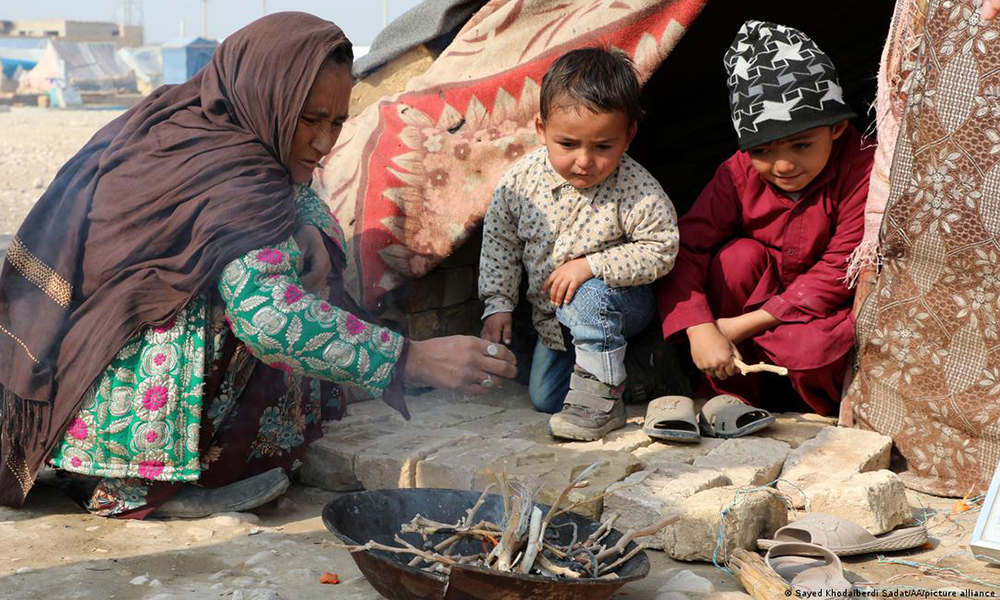
Last year, 2023, was a year of “tremendous challenges” for the people of Afghanistan, but it was also a year marked by resilience and determination, the Deputy Special Representative of the Secretary-General, Resident and Humanitarian Coordinator, Indrika Ratwatte, said in the UN’s annual report on Afghanistan that was published this week.
Ratwatte said: “In the face of adversity and multiple concurrent shocks, the people of Afghanistan have demonstrated remarkable courage and strength.”
Afghans now mention access to food as their most pressing need, he said adding that “unable to pay for or produce basic sustenance, millions face hunger and malnutrition.”
In 2024, an estimated 15.8 million people will experience crisis and emergency levels of food insecurity.
The majority of the population is unable to procure basic needs such as healthcare, food, livelihoods, and housing, the report stated.
The UN found that the country also remains vulnerable to climate change.
Following the worst drought in three decades, emerging El Niño conditions now threaten a new cycle of flooding and crop pests. In this context, lifesaving humanitarian aid has been crucial in preventing the collapse of the social fabric. It has also served to underpin the stability of the economy. Despite growing humanitarian needs, relevant funding cuts have forced humanitarian actors to prioritize the most vulnerable further, the report stated.
A Gallup poll found that 95 percent of the population consider themselves to be suffering. In addition to living in poverty, the average life expectancy in Afghanistan has been falling for the past five years.
The Herat earthquakes and unprecedented large-scale returns of refugees from neighbouring countries, including Pakistan and Iran, have shown the disruptive impact of recurrent shocks and underscored the need for sustained international engagement and support, the UN stated.
“As we embark on the next chapter, in 2024, it is imperative that we remain steadfast in our commitment to the principles of human rights, gender equality, and women’s Empowerment,” Ratwatte said.
“We will continue to include women as key partners in our work, to provide assistance ‘by women, for women’, and to tirelessly work for equal access to education in line with the demands we hear from Afghans in all areas of the country,” he said.
However, from an economic point of view, Afghanistan’s economy appears to be stabilizing at a low equilibrium level following a period of significant contraction since 2021.
The UN said in the report that growth barriers include severely restricted operations in the banking sector (including microfinance institutions), trade disruptions, and institutional issues hindering service delivery, including in the private sector.
“The sudden cessation of a significant amount of international aid and grants, which had accounted for 40 percent of the country’s Gross Domestic Product (GDP), along with a freeze on international reserves amounting to about US$9 billion and the imposition of international sanctions, caused a severe balance of payments, banking and payment systems crisis.
“Notably, financial restrictions have removed liquidity from the banking system,” the report stated.
Despite the crisis and a period of devaluation towards the end of the year, the AFN is 20 percent stronger than it was in 2021 due to currency export controls, UN cash shipments of US dollars into Afghanistan, and personalremittances.
Imports continued to surpass exports through 2023 and increased as the economy contracted.
“This appears to be a paradox: the currency appreciated while the trade deficit widened, suggesting that there might be other unidentified sources of financing besides US dollar cash shipments and remittances to support the account deficits,” the report read.
The UN also said that with its partners, it will work to initiate a dialogue with the Islamic Emirate on adjustments to regulatory frameworks and sustained public service delivery with the aim of creating a long-term and sustainable pathway to reduce aid dependency and put Afghanistan back on a path towards development
“In this regard, we reiterate our offer to the DFA for a dialogue and will work jointly with international partners, donors, and Afghans on how such engagement can be structured in a most productive way.”
Latest News
Beijing hosts Afghan delegation for talks on a wide range of issues

The third meeting of the China-Afghanistan working-level liaison mechanism on humanitarian assistance and economic reconstruction was held in Beijing this week where in-depth talks were held on numerous issues relating to Afghanistan.
Liu Jinson, Director of the Asian Department of China’s Ministry of Foreign Affairs, and Jalali, Director of the Third Political Department of the Ministry of Foreign Affairs of Afghanistan, co-chaired the Beijing meeting.
Also in attendance were representatives from various Chinese commissions, government departments, international aid organizations, as well as the Afghan Ministry of Commerce and Industry, the Ministry of Mines and Petroleum, the Ministry of Disaster Management, and the Ministry of Refugee Affairs.
Quoting an Afghan proverb, Liu said at the meeting that “friends come and go, but neighbors always remain.”
He pointed out that since 2021, China has implemented a diplomatic concept of amity, sincerity, mutual benefit and inclusiveness that was proposed by President Xi Jinping in terms of Beijing’s dealings with Afghanistan.
China has also adhered to a friendly policy towards all Afghan people, and adhered to the principle of respect for the country’s independence, sovereignty and territorial integrity.
He also said that during the different regimes in Afghanistan, China has always provided support and assistance for Afghanistan’s peaceful reconstruction and economic development.
The Afghan delegation meanwhile stated that the Islamic Emirate attaches great importance to developing relations with China, and thanked China for taking the lead in sending a new ambassador to Afghanistan and accepting the appointment of an ambassador to China.
The Islamic Emirate said Afghanistan is willing to deepen friendly relations with China, maintain traditional friendship, and will, as always, support China in safeguarding its core interests and achieving national reunification.
The two sides agreed in the meeting that Afghanistan is currently facing multiple challenges such as floods, droughts, and refugee resettlement, among other issues.
They also noted that the freezing of Afghanistan’s foreign assets by the United States has “aggravated the suffering of the Afghan people.”
The IEA stated however that it was “very grateful to China for its humanitarian assistance over the years and hopes to continue to receive help from China in refugee resettlement, disaster prevention and mitigation, improvement of medical and health conditions, and treatment of children with congenital heart disease.”
On the Belt and Road initiative, the IEA delegation said Afghanistan is deeply satisfied with the progress in practical cooperation between the two countries. They also said Afghanistan is willing to learn from China’s experience in modernization and development, and hopes that China will help Afghanistan cultivate more professional talents.
China meanwhile urged the international community to step up humanitarian assistance to Afghanistan, and said Beijing hopes the IEA will “actively respond to some of the international community’s reasonable concerns about Afghanistan’s inclusive governance.”
Liu in turn acknowledged the IEA’s efforts to promote economic reconstruction and said bilateral trade volume between China and Afghanistan reached US$1.33 billion last year, a record high and a year-on-year increase of 125.4%.
The Islamic Emirate meanwhile said in posts on X that the issue of investment opportunities in Afghanistan was widely discussed and both sides welcomed moves to pave the way for the export of pomegranates.
“Also, both sides talked about the latest developments in increasing the level of oil extraction in Afghanistan and starting the extraction of Logar’s Mes Aynak mine and it was emphasized that plans should be considered to speed things up,” the IEA stated.
“The Afghan side welcomed the capacity building training programs of civil servants in many ministries and agencies of the Afghan government with the support of China. In addition, the Chinese side promised to expand the range of scholarships to Afghan students according to the needs of Afghanistan,” the IEA stated.
Latest News
UN builds 470km of water canals in Afghanistan in past year
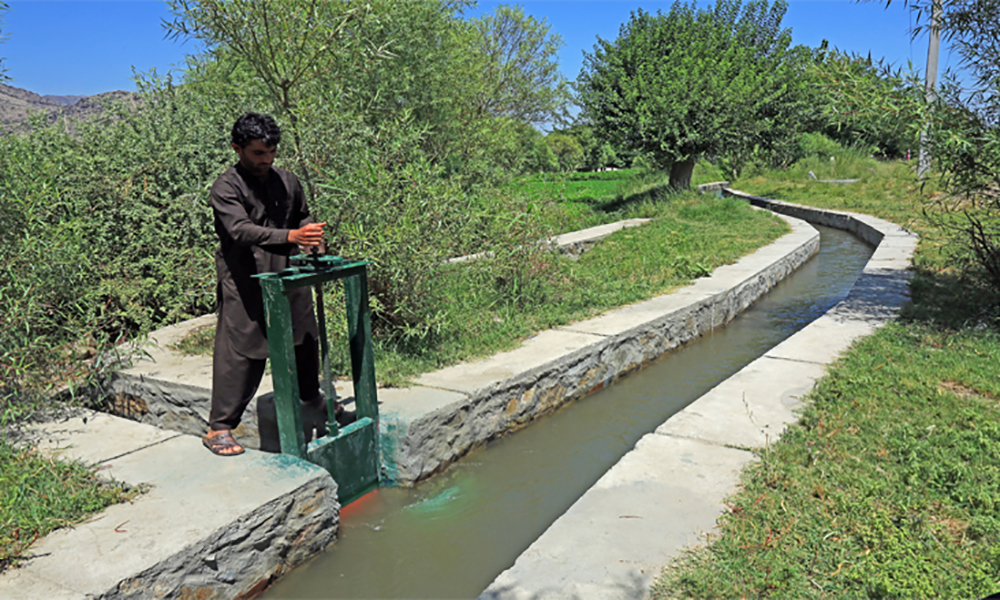
The United Nations has built 470 kilometers of much needed water canals in Afghanistan in the past year in cooperation with local communities, the World Food Program (WFP) confirmed.
WFP in Afghanistan said in a post on X, formerly Twitter, on Wednesday that the canals were built in order to provide access to water to more people across the country.
The agency said the people “in Afghanistan cannot continue their lives without access to water,” adding that the canals help farmers irrigate crops, which allows them to feed their families and sell surplus produce.
This comes after years of drought across the country. However, in the past few months, good rain has been recorded which will hopefully result in good harvests this year.
-

 Sport4 days ago
Sport4 days agoACL draw to be broadcast live on ATN channels
-

 Regional5 days ago
Regional5 days agoIRGC chief warns of harsher response if Israel attacks Iran
-

 Sport3 days ago
Sport3 days agoACL fever grows as fixtures finalized
-

 Regional5 days ago
Regional5 days agoIran launches retaliatory attack on Israel with hundreds of drones, missiles
-

 Latest News5 days ago
Latest News5 days agoContact group on Afghanistan hits roadblock over Pakistan’s gripe with India
-

 Sport5 days ago
Sport5 days agoHetmyer powers Rajasthan win in low-scoring IPL thriller
-
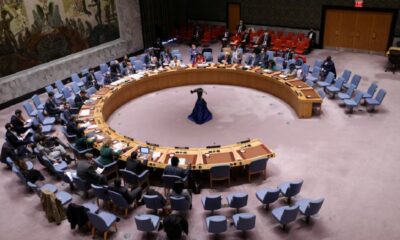
 World5 days ago
World5 days agoUN Security Council to meet Sunday on Iran attack
-

 World4 days ago
World4 days agoUS will not take part in any Israeli retaliatory action against Iran










